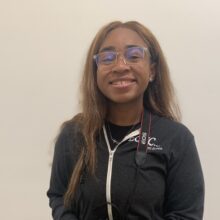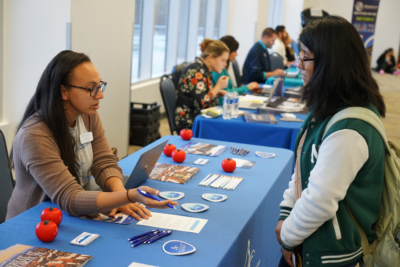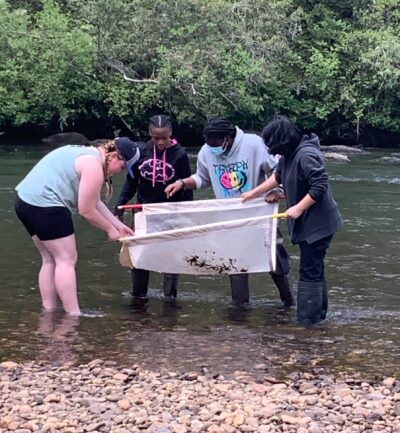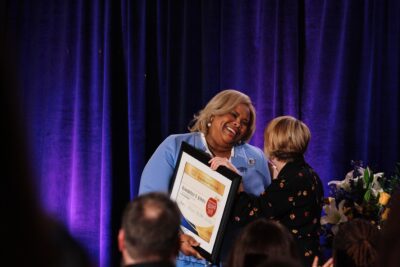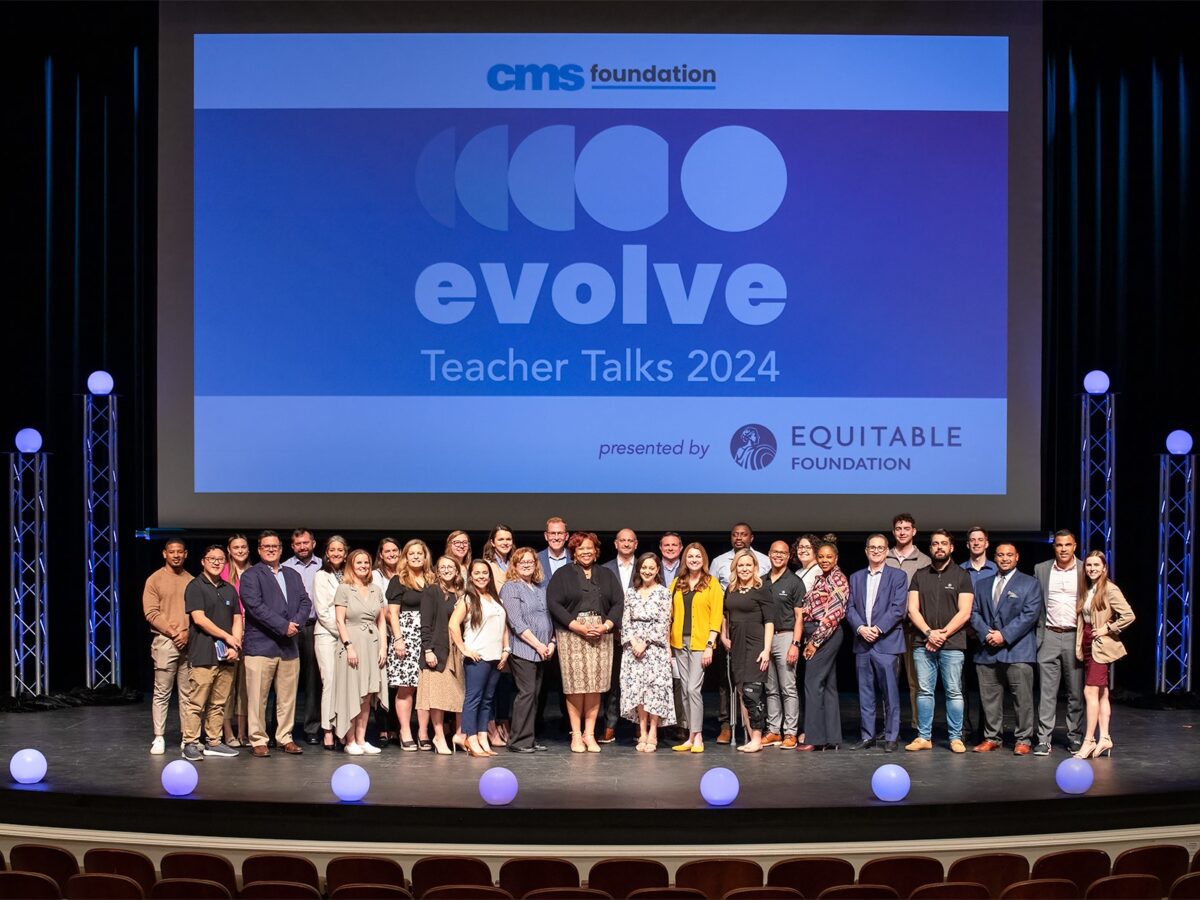
Share this story
- In March, two of North Carolina’s largest school districts hosted TED Talks-inspired events, where educators spoke about everything from delivering math and English instruction to how to survive a failed trust fall exercise. Read more about the event here.
- EdTalks and Teacher Talks are two district events that give educators a public platform to share their experiences in the classroom with the community. Here's a look at highlights from the events.
|
|
In March, two of North Carolina’s largest school districts hosted TED Talks-inspired events to connect teachers and the community.
On March 14, Charlotte-Mecklenburg Schools (CMS) and the CMS Foundation hosted their annual event, Teacher Talks, focused on the theme “Evolve.” One week later, the Wake County Public School System (WCPSS) and the Wake Ed Partnership hosted their first ever EdTalks — modeled after CMS’ speaker series — with the theme “Reimagine.”
Speakers at both events shared strategies for creating positive classroom environments and adapting to evolving technology to help teachers and students push forward.
Evolving in Charlotte
CMS invited four of their educators to share remarks at Teacher Talks, along with the 2023 National Teacher of the Year Rebecka Peterson and the 2023 Burroughs Wellcome Fund North Carolina Teacher of the Year Kimberly Jones.
“In all of my work as teacher of the year, the greatest recognition, and the greatest conclusion, that I’ve reached is that the greatest thing I will ever be as a teacher is a consummate and continual learner,” Jones said, sharing lessons from her nearly 20 years of experience as an English teacher at Chapel Hill-Carrboro City Schools.
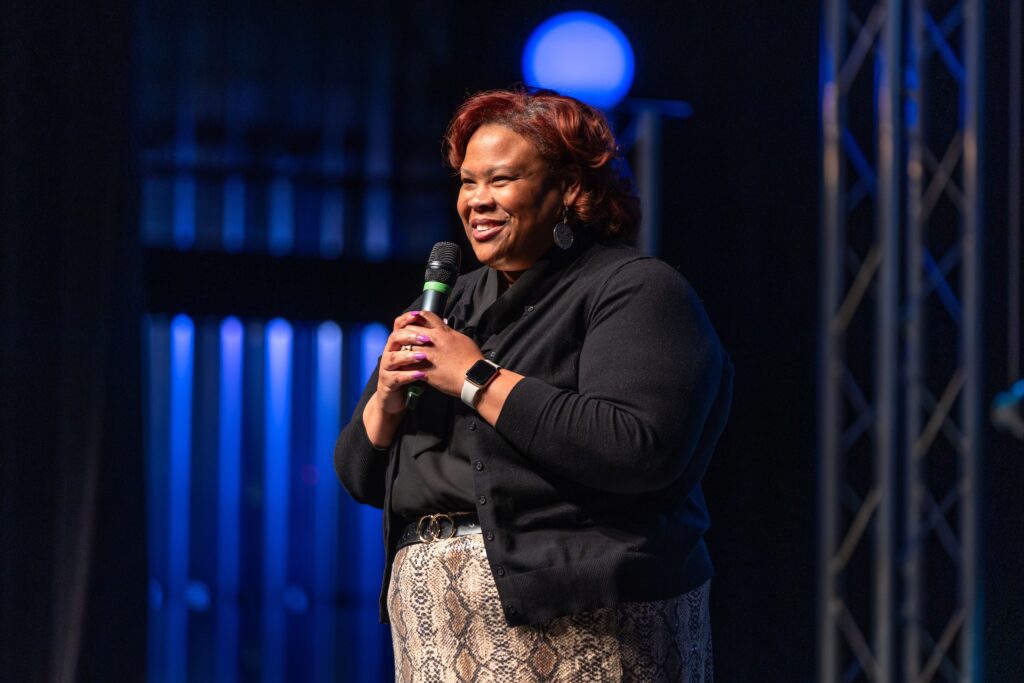
High school English teacher Franchone Bey spoke about the “seeds we plant along the way” in a student’s life journey.
Fellow English teacher Ana Cunningham, a former EdNC ambassador, said a “burnt out teacher cannot create an exceptional education experience.”
Jefferey Mercado, an instructional facilitator, told the audience he believes artificial intelligence can unlock an educator’s “greatest superpowers.”
“We can either get hit by the tidal wave of technology, or we can learn to surf,” Mercado said.
German immersion teacher Medine Yigit spoke about the need to create space for all student backgrounds and cultures.
“I have learned to stay open-minded, and not to be judgmental,” Yigit said.
Peterson, who teaches high school math in Tulsa, Oklahoma, closed the talk with a statement on building relationships.
According to a National Education Association (NEA) press release, Peterson had a blog, “One Good Thing,” which included daily reflections on something good that happened in her class. She told the NEA she works with her students to create joy in the classroom and during the learning process.
“The only way we win, and the only way our kids win, is when we do this work together,” Peterson said at Teacher Talks.
Reimagining in Wake County
A wide range of stakeholders including county commissioners, school board members, and other legislative members attended Wake Ed Partnership’s first ever EdTalks.
Bettina Pope, a 10th grade English teacher at Wake Forest High School, was the first speaker on stage at EdTalks.
As she reflected on her 29 years of experience and different roles in the school system, she told the audience that educators must learn from the past to have a brighter future.
Pope compared the experience of students in the classroom to a person scrolling on social media. When using social media, viewers scroll past posts that are irrelevant to them and stop for the ones that spark a connection.
“Our students are no different,” she said. “The world and all its knowledge are at their fingertips. From their point of view, why is learning what we’re presenting important? That information is a simple Google search away.”
Pope said it is an educator’s job to show students why learning is important.
“This is done by connecting the learning curriculum to their lives and communities — local and global, and by building bridges to real life,” said Pope, who also teaches world and African American literature.
Leonardo Baquero, an introductory high school math teacher at Heritage High School, said he “reimagines” course work for his students through three approaches: play, personalization, and perception.
Baquero said he knows his course attracts students who are “least enthusiastic” about math. He said his course is the lowest level course that students can take while still earning a math credit.
“I can tell there’s much more going on in their lives than just their dislike of math. For instance, my student always looks tired in the front row, because he is crammed into a hotel bedroom along with the rest of his family after they got thrown out of their apartment for being unable to pay the rent,” Baquero said. “Or another student, who comes in late 15 minutes every day because she lives two towns over with her aunt because their mother lost custody due to substance abuse. So what do I do? I teach them math.”
Baquero said he has seen the benefits of personalized instruction for all students.
Once, he asked the class how to tell if triangles are congruent. One student eagerly responded, “los palitos,” which means “little sticks” in Spanish, referring to congruent line segments in triangles. The class used the phrase for the rest of the semester.
“The students had ownership, a root ability to relate to this math concept,” Baquero said. “What was once foreign and off-putting was now something the whole class could agree on. And instead of being told what the math was, they claimed the free agency to decide what math was to them.”
Reimagining for the community
For 28 years, Betsy Moore has worked in several roles as an educator. While currently working as an instructional facilitator and literacy coach, she is also active in her community through the church and a local gym. She believes “everyone has a gift, and wants everyone to have a voice.”
While showing youth how to take ownership of their education, Moore said there should be more education on how to have open conversations about drug use with her students and their families.
Moore said that her son Wilson died in February at 18 years old, after accidentally overdosing on fentanyl. While grieving the loss of her son, she said she wants to help fight the opioid crisis in her community.
The Centers for Disease Control previously reported that median monthly adolescent overdose deaths more than doubled between 2019 and 2021.
“I want you to reimagine how we can educate ourselves and teach one another so this does not happen,” Moore said. “And (so) that we can find ways to teach us to not take prescription drugs that don’t belong to us… and to not experiment with drugs.”
Taking reimagination literally
Elders knows how to facilitate communication. He has increased student productivity and engagement with the material in an Advanced Placement seminar course at Heritage High School. He was also purchased at the state fair.
Elders is a stuffed horse that English teacher Jason King keeps in his classroom — along with other toys and unconventional class decorations.
“Students reported that the horse increased their productivity and engagement with the material,” King said. “The stuffed animal helped disassociate the class from expectations of traditional academic institutions and allowed students to reimagine their experience in a unique way.”
King said his goal is to create a safe, empowering space for students. He said his use of metaphors, stories, and characters helps students reimagine their experience in class while discussing literature.
“We have to reimagine this younger generation as a wellspring of insight into how to live and conduct ourselves,” King said. “And so I challenge you, as stakeholders, to continue asking yourself, what in the world are you doing to grab the attention of this younger generation and push them toward their destiny?”
Elementary teacher Neil McEwen also said he believed in incorporating fun activities to engage his students. He said one of his earliest memories as a student was watching the Duke basketball team during the playoffs in class — a tradition he keeps with his students as a fifth grade teacher.
McEwen said he strives to create memorable and out-of-the ordinary experiences for students. He showed the audience a video of him doing just that, dressed as an astronaut and standing on a desk in his classroom.
While dressed as the school mascot, he told his students they were going to do a trust fall. After he fell back and no one caught him, he stopped the clip and told the audience he was “happy that happened.”
“And the reason why is because inevitably, like in life when we do these things, something’s gonna go wrong. Challenges are gonna come up,” McEwen said. “Adversity is gonna come and it’s in those moments, where the beauty lies. It says those types of moments where relationships are built and strengthened.”
Though he seeks to create engaging experiences in his class, McEwen said a statewide emphasis on achievement sometimes limits a teacher’s ability to do so.
“As teachers, we’re required to have high-ranking standardized scores on our student test, have data that shows year-over-year growth, and adhere to a curriculum that follows a strict pacing guide with little room for flexibility,” McEwen said. “None of those things are bad in itself and I’m okay with accountability… But these requirements present a high level of stress and pressure for teachers and for students.”
McEwen said the pressure for high standardized test scores is part of the reason why people “aren’t knocking down the door right now to become teachers.” He said the performance of students is linked to a teacher’s reputation, therefore test preparation ends up being the main, or only, focus.
“If we do find a way to incorporate fun and memorable experiences for our students, we can interrupt the monotony of the day to day and we can inject life back into our classrooms,” McEwen said. “I’ve seen this year after year. My own class priorities are reimagined, stress slowly fades, pressure gets taken down a notch, and students feel more freedom to just be themselves.”
The Equitable Foundation
If you haven’t heard of them, EdNC’s Mebane Rash says get ready to hear more and more about The Equitable Foundation. Their website says, “we are seen as a Force for Good within the communities where we live and work.”
You can see the full list of grantees in North Carolina on their website, and Rash has noticed them supporting a wide range of education partners, including DPI’s AIM conference, the state teacher and principal of the year awards, as well as supporting student advocacy on issues like FAFSA.
This is the Equitable Foundation’s third year supporting Teacher Talks and first year supporting EdTalks.
Jarian Kerekes is the head of the Equitable Foundation and social impact. Somewhere between 30-40 employees of Equitable showed up for Teacher Talks, he said. “They care about education.”
Editor’s Note: Sonja Gantt, the executive director of the CMS Foundation, serves on the board of directors of EdNC.
Information and speeches from WCPSS’s event can be viewed on their website. Past Teacher Talks held at CMS are also available online.
